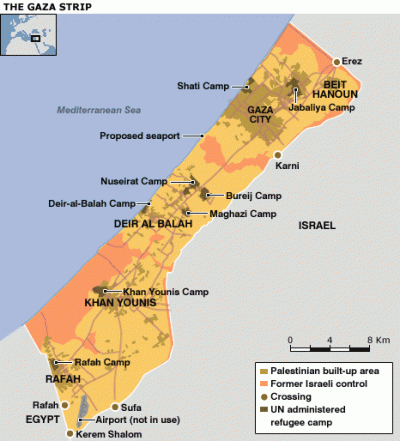100,000 Hours of Isolation: Gaza Blockade Enters Its 12th Year

A recent report by the Euro-Mediterranean Human Rights Monitor exposes the catastrophic consequences of Israel’s 11-year long blockade on the Gaza Strip.
While Israel is only continuing its long history of isolating Gaza yet at an unprecedented length and severity since 2006, the international community shoulders this isolation with silence and oblivion.
For eleven years, Israel has systematically used the two policies of isolation and division, in addition to violence, to keep the humanitarian situation in Gaza growing worse and worse
Ramy Abdu, chairman of Euro-Med Monitor
“The consequences of the blockade continue to aggravate in unimaginable ways,” says Ramy Abdu, chairman of Euro-Med Monitor. “The multiple, multifaceted and interconnected crises documented in our new report communicate much about civilian suffering in the Gaza Strip. Over 2 million people struggle with both growing rates of poverty, unemployment and food-insecurity and with diminishing quality of basic services, including electricity, water, education and healthcare.”
The report, Gaza: 100,000 hours of isolation, taking after the estimate duration of the blockade, brings to attention yet more shocking statistics of the humanitarian situation in Gaza. 65% of Gazans suffer from poverty, %72 are food-insecure, and 80% have grown dependent on international aid. 43% of Palestinians in Gaza face the heavy economic and social burdens of unemployment. This percentage, recorded in the fourth quarter of 2016, is unprecedentedly high, especially when compared to that in the West Bank, standing at 18.7%.
“For eleven years, Israel has systematically used the two policies of isolation and division, in addition to violence, to keep the humanitarian situation in Gaza growing worse and worse,” Abdu said. “The facts our report explains are simple: Maintaining complete control over the Gaza Strip, Israel remains the occupying power and as such must assume responsibility for the suffering of an entire population it has collectively punished for over a decade.”
For 11 years now, as cited in the report, Israel has exercised absolute authority on commercial and non-commercial entry and exist points, controlling trade, the entry of international aid, vital medical equipment and construction and other necessary materials, and the issuing of leave and re-entry permits for students wishing to study abroad, professionals with job offers in foreign countries and patients needing treatment unavailable in the Gaza Strip.
The blockade, entering its twelfth year, has caused enormous economic losses. With Israel’s restrictions on movement of exports and imports and of traders, it is harder than ever to start up a business or to develop an old one. This recession, nonetheless, has been typical of the blockade years, during which crossings from and into the Gaza Strip remained closed most of the time. For example, Kerem Shalom crossing was closed for 36% of the days in 2016.
“Israel’s offenses on Palestinians are not only military and economic but also humanitiarian,” says Maha Hussaini, Euro-Med Monitor office manager in the Palestinian territories. “A large number of patients seeking treatment in the West Bank, Israel or abroad are systemically and arbitrarily denied permits to leave Gaza. Our research confirms that, during the fourth quarter of 2016, only 44% of patient requests for Israeli permits were approved.”
One in every 4 Palestinian children in Gaza still needs to receive psychosocial support to overcome the traumatic memories of violence witnessed during Operation Protective Edge. Between January and December 2016, 1,900 out of 3,700 Erez crossing permits for Palestinian businessmen were deliberately cancelled. In late 2016, Israel approved only 50% of permit requests for medical purposes, which is very low compared to the percentage in 2012, standing at 92.5%.
With a dense population long-subjected to intense suffering, Gaza cannot stand too long on this brink of collapse
Maha Hussaini, Euro-Med Monitor office manager in the Palestinian territories
Israel’s frequent killing and detention of Gazan fishermen in Palestinian territorial water has led to the drop of their number from 10,000 in 2000 to 4,000 in 2016. 95% of those fishermen now rely on international aid in providing for their families, according to the UN Office of Coordination of Humanitarian Affairs.
“Israel has been leading Palestinians to more and more suffering- political, economic, physical, mental, and humanitiarian,” concludes Hussaini. “With a dense population long-subjected to intense suffering, Gaza cannot stand too long on this brink of collapse. Israel must abide by its legal obligations and the international community by its humanitarian responsibilities. We reiterate our belief in the need for ending the siege as a precondition to improving not only the lives of Palestinians but also the prospects of security and peace.”
The Euro-Mediterranean Human Rights Monitor therefore urgently demands the International Community to help alleviate immediately the blockade on the Gaza Strip.
First,we demand the Israeli government to end the blockade.
Second,we call on the Israeli government to end the targeting of innocent citizens, a practice in violation of the 1949 Geneva Convention.
Third,we call on the Egyptian government to open the Rafah Crossing for passengers and goods, without any restrictions.
Fourth,we call on the international community to hold Israel accountable for its continuous human rights violations, and to economically sanction Israel until it respects Palestinians’ human rights. The international community should be able to separate between the collective punishment of the Palestinians by Israel and the political conflict between Palestine and Israel.
Fifth,we call on the International community, the EU and the US in particular, to initiate and support the need for a seaport in Gaza thatguarantees the free import and export of goods and private international travel. Commitments for the seaport in Gaza not only address a priority and need of the Palestinians, but also serve as political support for their desire to gain independence.
Click here to read the full report


